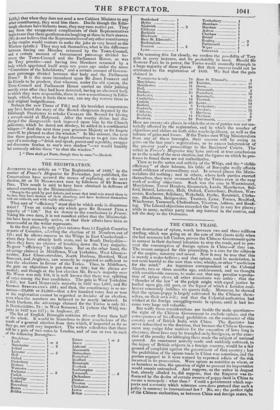THE REGISTRATION.
ACCORDING to an article on " The Registration of 1839," in the number of Fraser's Magazine for November, just published, the Conservatives have secured the means of replacing, at the next election, 60 or 70 MELBOURNE men by followers of Sir ROBERT PEEL. This result is said to have been obtained in defiance of unusual exertions by the Ministerialists- s Stung to the quick by past defeats, and aware that total ruin stared them in the face, they have shaken off their slumbers, and have bestirred themselves with one consent, and with visible efficiency."
What sort of "efficiency" must that be which ends in disastrous defeat ? "fives an unlucky stir which gave Sir ROBERT PEEL a majority of "150." But we demur to the conclusions in Fraser. Taking his own data, it is not manifest either that the Ministerial- ists have been unusually active, or that their efforts have been so unsuccessful as the writer represents. In the first place, be only gives returns from 15 English Counties or parts of Counties, t.■'.,!eting the election of 31 Members out of 158; and he allows success to the Whigs in East Cumberland— where they have already both seats, and in South Derbyshire— where they have no chance of breaking down the Tory majority. No great "efficiency "is visible here. But on the other hand, the advantage claimed in Middlesex, West Yorkshire, West Glouces- tershire, East Gloucestershire, North Durham, Herttbrd, West Somerset, and Anglesey, can scarcely be regarded as sufficient to turn the elections in favour of the Tories. Thus, in Middlesex, the gain on objections is put down at 390; but the claims are omitted; and though at the last election Mr. ByNo's majority over Mr. Wool> was only 168, it is well known that there was splitting of votes among the tbur candidates. The gain in West Yorkshire is 353 ; but Lord Moarmn's majority in 1837 was 1,087, and Sir GEORGE STRICKLAND'S 493; and then, the constituency IS SO nu- merous-23,000 or 24,000—that a few hundred votes lost or won at the registration cannot be regarded as decisive of an election, even when the numbers are believed to be nearly balanced. In lorth Durham, the advantage claimed for the Tories is only 35 ; !it Herftbrdshire, 78 ; in West Somerset, 74 (where the Whig ma- jority in 1837 was 127) ; in Anglesey, 27.
The list of English Boroughs contains 81—or fewer than half of the whole. It would be hazardous to draw conclusions of the result of a general election from data which, if impartial as far as they go, are still very imperfect. The writer calculates that there will be a gain of two votes in London, and of one or two in each of the following Boroughs-
Marylebone 1 Totnes 1 or 2 Leeds 1 or 2 Dover 1 o Manchester 1 2 Liskeard 1 Salford 1 Monmouth 1 Leicester 1 2 Malmesbury 1 Hull 1 Pontefract 1
Oxford 1 Bradford 1 Canterbury I Barnstaple 1 Durham 1 Evesham 1 Worcester 1 Southampton 1
Rochester 1 ... 2 Yarmouth 1 2
Carlisle 1 Cheltenham 1 Cambridge 1 Preston 1 Bedford - 1 Tiverton 1 Shrewsbury 1 Chieheater 1
Boston 1 Lewes 1
Halifax 1 Bolton 1
Tewkesbury I
Shoreham
1
Horsham
1
Ashton 1
Chatham I
Bristol I
Reading 1
. 2
Portsmouth 1 .. 2 Wigan 1
Greenwich 1
On scanning this list closely, we confess the possibility of Tory gain in every instance, and its probability in most. Should Sir Ronnwr PEEL be in power, the Tories would assuredly triumph in a large majority of these places. But their success could not be attributed to the registration of 1839. We find that the gain claimed in
Westminster is only 74 Bury St. Edmund's, 3 Marylebone, 28 Taunton, 17 Manchester, 31 Dover, 28 Hull, 48 Momnouth, 2 Durham, 20 Pontefract, 12 Rochester, 4 Barnstaple, 2 Cambridge, 12 Tiverton, 10 Carlisle, 23 Lewes, 13 Bedford, 3 Tewkesbury, 17 Sandwich, 10 Evesham, ' 12 (litheroe, 3 Horsham, 3
Rochdale, 14 Chatham, 6 Bradford, 92 Portsmouth, 27 Here are v places in which the state of parties was not ma- terially affected by the registration, and in which the number of objections and claims on both sides was insignificant, as well as the balance of gains and losses. If the Tories oust Whig Ministeralists from any of these boroughs, their success will be owing to gains on the last year's registrations, or to causes independent of the present year's proceedings in the Barristers' Courts. The writer in Fraser's Magazine may have arrived at true conclusions as to the result of the next election, but the figures on which he pro- fesses to found them are not authoritative.
Then as to the union and activity of the Whigs, and the "visible efficiency" of their labours, his table of Boroughs really affords small evidence of extraordinary zeal. In several places the Minis- terialists did nothing; and in others, where both parties exerted themselves, they were overmatched by the Tories even in the easy work of nicking objections. Such was the case in Westminster, Marylebone, Tower Hamlets, Greenwich, Leeds, Manchester, Sal- ford, Bristol, Leicester, Hull, Oxford, Canterbury, Durham, Wor- cester, Rochester, Salisbury, Wakefield, Hythe, Sandwich, Clithes roe, Blackburn, Bridgewater, Taunton, Lyme, Totnea, Bradford, Winchester, Yarmouth, Cheltenham, Tiverton, Ashton, and Read, • ing. The Liberal objections exceeded the Tory in very few places; while in many, neither party took any interest in the contest, and
left the duty to the Overseers. .
- Sandwich . Sunderland • Rythe Bury St. Edmund's 1 Clitheroe Rochdale Buckingam
Taunton 1 1 1 1 1 1 1 Blackburn 1 h
Lyme 1


























 Previous page
Previous page